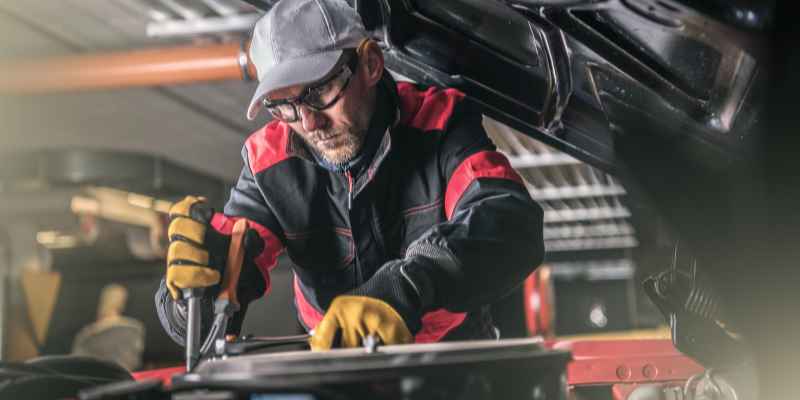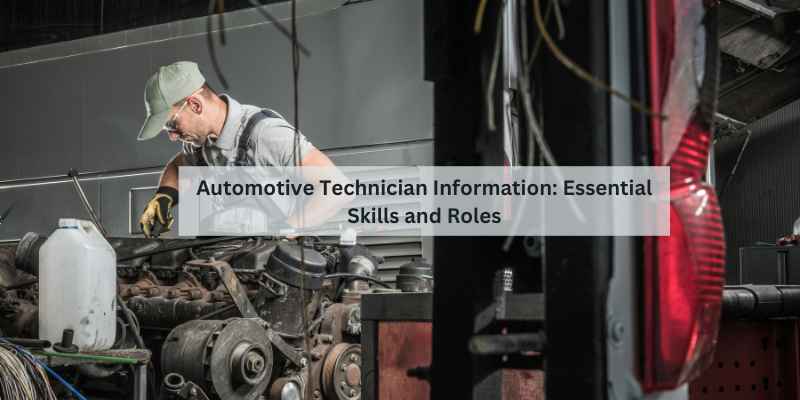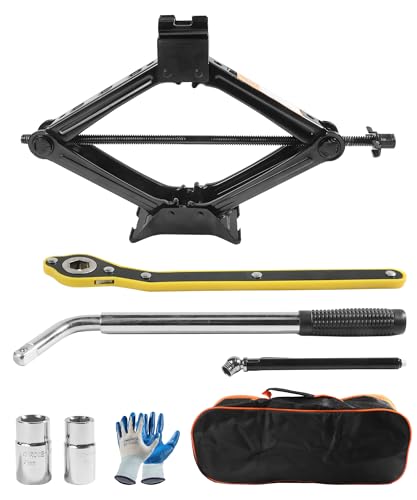Automotive Technician Information: Essential Skills and Roles
An automotive technician is a mechanic who specializes in servicing and repairing automobiles, working with one or more automobile brands or any brand. Their main role is to accurately and quickly diagnose and repair the problem with the vehicle.
This includes performing basic maintenance tasks such as changing oil, checking fluid levels, and rotating tires, as well as repairing or replacing worn parts like brake pads, wheel bearings, and sensors. Automotive technicians also communicate with clients to explain automotive problems and repairs.
The responsibilities, salaries, degree of education, and training programs associated with each automotive technician profile may vary. Becoming an automotive technician can be a rewarding career, but it is physically demanding and can involve liability concerns.
Introduction To Automotive Technician Roles
When it comes to the automotive industry, the role of an automotive technician is crucial for ensuring the smooth operation and maintenance of vehicles. Automotive technicians, also known as auto mechanics, play a significant role in diagnosing, repairing, and maintaining automobiles. In this section, we will delve into the key responsibilities and career outlook for individuals pursuing a career as automotive technicians.
Key Responsibilities
As an automotive technician, there are several key responsibilities that form the core of the role. These include:
- Performing basic care and maintenance tasks such as changing oil, checking fluid levels, and rotating tires.
- Repairing or replacing worn parts including brake pads, wheel bearings, and sensors.
- Conducting repairs according to manufacturer and customer specifications.
- Explaining automotive problems and repairs to clients in a clear and understandable manner.
Career Outlook
The career outlook for automotive technicians is promising, with a steady demand for skilled professionals in the automotive repair and maintenance industry. According to the U.S. Bureau of Labor Statistics, the employment of automotive service technicians and mechanics is projected to grow x% from [year] to [year], indicating a positive trend in the job market for individuals pursuing this career path.
Essential Skills For Automotive Technicians

Automotive Technicians require a diverse skill set to excel in their profession. These essential skills encompass Diagnostic Expertise, Mechanical Knowledge, and Customer Service.
Diagnostic Expertise
- Proficient in using diagnostic tools
- Ability to identify and troubleshoot mechanical issues
- Expertise in interpreting error codes
Mechanical Knowledge
- Understanding of vehicle systems and components
- Skilled in performing maintenance and repairs
- Knowledge of engine, transmission, and electrical systems
Customer Service
- Effective communication with clients
- Ability to explain complex technical issues in simple terms
- Attentiveness to customer needs and concerns
Technical Know-how
When it comes to automotive technicians, possessing the necessary technical know-how is crucial. This expertise encompasses a deep understanding of vehicle systems, diagnostics, and repair procedures, allowing technicians to efficiently and effectively address automotive issues.
Tools Of The Trade
Automotive technicians rely on a variety of specialized tools to perform their duties. These may include diagnostic equipment, wrenches, socket sets, and power tools, among others. The ability to proficiently utilize and maintain these tools is essential for ensuring accurate and timely repairs.
Staying Updated With Technology
With the automotive industry continually evolving, technicians must stay abreast of the latest technological advancements. This involves understanding modern vehicle electronics, computerized systems, and diagnostic software. By staying updated, technicians can effectively diagnose and address complex issues in today’s advanced vehicles.
Problem-solving In Auto Repair
Problem-solving is at the core of an automotive technician’s responsibilities. From diagnosing complex vehicle issues to prioritizing safety and efficiency, these professionals play a crucial role in keeping vehicles running smoothly and ensuring the safety of drivers and passengers.
Diagnosing Vehicle Issues
When a vehicle malfunctions, automotive technicians are tasked with pinpointing the root cause of the problem. Utilizing advanced diagnostic tools and their extensive knowledge of automotive systems, they meticulously inspect and analyze various components to identify the issue accurately.
Prioritizing Safety And Efficiency
Ensuring the safety and efficiency of a vehicle is paramount for automotive technicians. They prioritize the identification and resolution of safety-related issues, such as brake malfunctions and steering abnormalities, to guarantee the overall safety of the vehicle’s operation. Simultaneously, they strive to optimize the vehicle’s performance and fuel efficiency through meticulous maintenance and repair processes.
Routine Maintenance Mastery
Automotive technicians play a crucial role in ensuring the smooth operation and longevity of vehicles through routine maintenance. Mastering the art of routine maintenance is essential for these professionals to uphold the performance and safety of automobiles.
Preventative Services
Preventative maintenance is at the core of an automotive technician’s responsibilities. This includes regular inspections to identify potential issues before they escalate into major problems. By conducting thorough assessments, technicians can address minor concerns and prevent costly repairs down the line.
Fluid And Filter Changes
Fluid and filter changes are vital for maintaining the optimal performance of vehicles. Technicians are adept at replacing engine oil, coolant, transmission fluid, and filters such as air and fuel filters. These tasks are crucial for preserving the efficiency and longevity of the engine and its components.
Advanced Repairs And Replacements
When it comes to advanced repairs and replacements, automotive technicians are skilled professionals who handle complex issues with precision and expertise. From engine and transmission work to electrical system fixes, these technicians are equipped to address a wide range of challenges, ensuring that vehicles are restored to optimal condition.
Engine And Transmission Work
Automotive technicians are adept at diagnosing and repairing engine and transmission issues. Whether it’s a faulty cylinder, a worn-out gasket, or a malfunctioning transmission component, these experts have the knowledge and experience to tackle the most intricate problems. Using specialized tools and diagnostic equipment, they meticulously examine the engine and transmission, identifying the root cause of the issue and implementing effective solutions to restore optimal performance.
Electrical System Fixes
The electrical system of a vehicle is a complex network of components that requires meticulous attention to detail. Automotive technicians are proficient in troubleshooting and repairing electrical system malfunctions, including issues with the wiring, battery, starter, alternator, and electronic control modules. By leveraging their expertise, they ensure that the electrical components operate seamlessly, enabling the vehicle to function reliably.
Customer Interaction And Education
Engaging with customers and providing educational information is crucial for Automotive Technicians. They diagnose issues accurately, explain repairs clearly, and ensure clients understand their vehicle’s needs. By building trust through interaction and education, technicians enhance customer satisfaction and loyalty.
Explaining Technical Details
Customer interaction plays a crucial role in educating clients about technical car issues. By explaining technical details in a simple manner, automotive technicians can help customers understand the repair process better.
Building Trust And Loyalty
Effective customer education can build trust and loyalty. By engaging with clients, explaining repairs, and providing transparent information, automotive technicians can establish lasting relationships with customers.
The Road Ahead For Automotive Technicians
As automotive technology continues to advance at a rapid pace, the road ahead for automotive technicians is filled with new challenges and opportunities. In order to stay competitive and provide high-quality service, automotive technicians must focus on continuous learning and adaptation to new vehicle technologies.
Continuous Learning
Continuous learning is essential for automotive technicians to stay updated with the latest advancements in vehicle technology, diagnostic tools, and repair techniques. This can involve participating in training programs, workshops, and certifications to enhance their skills and knowledge.
Adaptation To New Vehicle Technologies
With the rapid integration of electric and hybrid vehicles, as well as advanced driver-assistance systems (ADAS) and autonomous technology, automotive technicians must adapt to these new vehicle technologies. This may require specialized training and expertise to effectively diagnose and repair these advanced systems.

Frequently Asked Questions
What Is The Job Description Of A Automotive Technician?
An automotive technician performs basic maintenance, repairs worn parts, and explains automotive issues to clients.
What Is An Automotive Technician?
An automotive technician, also known as an auto mechanic, is a professional who specializes in repairing and maintaining automobiles. Their main job is to diagnose and fix any issues with a vehicle, such as replacing worn parts, changing oil, and rotating tires.
They work with all types of car brands and must have a thorough understanding of how cars work.
What Are The Pros And Cons Of Being An Automotive Technician?
Becoming an automotive technician can be a rewarding career choice as you get to work independently and solve problems. You also get to help people with their car troubles. However, the job can be physically demanding and comes with liability risks.
What Is The Job Description Of A Technician?
An automotive technician performs basic maintenance, repairs worn parts, and communicates with clients about automotive issues.
Conclusion
The role of an automotive technician involves diagnosing and repairing vehicle issues efficiently. From basic maintenance to complex repairs, these professionals play a crucial role in keeping vehicles running smoothly. Pursuing a career as an automotive technician can be rewarding and fulfilling.







